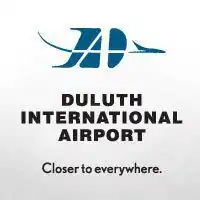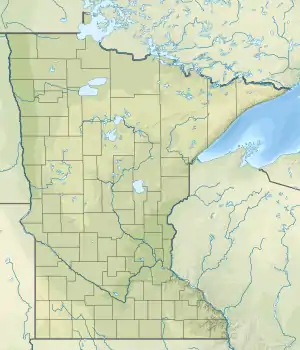Duluth International Airport
Duluth International Airport (IATA: DLH, ICAO: KDLH, FAA LID: DLH) is a city-owned public-use joint civil-military airport located five nautical miles (9 km) northwest of the central business district of Duluth, a city in Saint Louis County, Minnesota, United States.[2] It serves the Twin Ports area, including Superior, Wisconsin. Mostly used for general aviation but also served by three airlines, it is Minnesota's third-busiest airport, behind Minneapolis–St. Paul International Airport (MSP) and Rochester International Airport.[3]
Duluth International Airport | |||||||||||||||
|---|---|---|---|---|---|---|---|---|---|---|---|---|---|---|---|
 | |||||||||||||||
| Summary | |||||||||||||||
| Airport type | Public | ||||||||||||||
| Owner | City of Duluth, Minnesota | ||||||||||||||
| Operator | Duluth Airport Authority | ||||||||||||||
| Serves | Duluth, Minnesota and Superior, Wisconsin (Twin Ports) | ||||||||||||||
| Location | St Louis County, Minnesota, United States | ||||||||||||||
| Opened | 1930 | ||||||||||||||
| Elevation AMSL | 1,428 ft / 435 m | ||||||||||||||
| Coordinates | 46°50′32″N 092°11′37″W | ||||||||||||||
| Website | www.DuluthAirport.com | ||||||||||||||
| Map | |||||||||||||||
 DLH Location of the airport in Minnesota  DLH DLH (the United States) | |||||||||||||||
| Runways | |||||||||||||||
| |||||||||||||||
| Statistics | |||||||||||||||
| |||||||||||||||
- For the United States Air Force use of this facility, see Duluth Air National Guard Base.
The Minnesota Air National Guard's 148th Fighter Wing, equipped with F-16C Fighting Falcons, is based at Duluth Air National Guard Base, which is located on the grounds of the airport. Aircraft manufacturing company Cirrus is also based on the airport grounds, where it has its main manufacturing facility and headquarters.
History
The City of Duluth purchased the original property for the airport in 1929 from Saint Louis County. The airport was constructed on 640 acres (2.6 km2) of land with two 2,650-foot (810 m) sod runways. In 1930, the airfield was dedicated as Williamson–Johnson Municipal Airport.
In 1940, Northwest Airlines began the first regularly scheduled air service to Duluth. Two years later, operations were temporarily halted by World War II.[4]
In 1942, three runways were paved. Each runway was 4,000 feet (1,200 m) long, 150 feet (46 m) wide, and at nearly equal angles from each other, 30, 90, and 130 degrees. They were identified as runways 3–21, 9–27, and 13–31, respectively. The Corps of Engineers extended Runways 9–27 and 3–21 to 5,699 feet (1,737 m) in 1945. In 1951, the USAF extended Runway 9–27 to 9,000 feet (2,700 m) with a 1,000-foot (300 m) overrun and the control tower was built. Runway 9–27 was rebuilt in 1956 and extended in 1966 to 10,152 feet (3,094 m) in length.
The original terminal building was built in 1954, south of Runway 9–27 and west of Runway 3–21. The terminal floor area was 14,200 square feet (1,320 m2) with 280 parking spaces. It would serve the airport for nearly 20 years.
In 1961, the Duluth Airport Authority Board renamed the facility Duluth International Airport.
In 1973, a new Terminal Building and U.S. Customs, International Arrivals Building, were completed east of Runway 13–31 and opened for operation. Runway 13–31 was shortened to 2,578 feet (786 m) to accommodate construction of an addition to the International Arrivals building. This resulted in Runway 13–31 being closed as a runway due to obstructions. Runway 13–31 was re-striped in 1980, decreasing its width to 75 feet (23 m), for use as a taxiway. In 1989, the newer terminal building and the adjacent structures were connected to form one enclosure. The original terminal building was then converted for use as offices for general aviation, the FAA, and the U.S. Weather Bureau. The 1973 terminal building had its last flight take place on January 13, 2013.
In 2013, a new passenger terminal was built directly in front of the 1973 terminal. This new building solved several problems of the previous terminal building, including that the tails of parked airplanes extended too close to the runway due to FAA airspace changes made after the building's completion. This terminal building has restrooms and concessions beyond the TSA security checkpoint, something the previous terminal lost when screening processes were put in place after 9/11. The first flight to leave the new terminal was on January 14: United Express Flight 5292 to Chicago O'Hare.
On October 30, 2015, the new terminal was named for the late U.S. Representative Jim Oberstar, who represented the congressional district in which the airport lies from 1975 to 2011 and helped secure funding for the facility before its 2013 opening.[5][6]
A 370-stall parking ramp with skywalk connection to the terminal was completed in fall 2014.[7]
On May 23, 2019, American Airlines began twice-daily service to Chicago O'Hare International Airport.[8] American ceased operations into Duluth in April 2020, citing lackluster demand.[9]
In 2020, the airport received a $5,246,844 federal grant via the CARES Act.[10][11]
Facilities and aircraft
Duluth International Airport covers an area of 3,020 acres (1,220 ha) at an elevation of 1,428 feet (435 m) above mean sea level. It has two runways: 9/27 is 10,591 by 150 feet (3,228 m × 46 m) with a concrete surface and 3/21 is 5,719 by 150 feet (1,743 m × 46 m) with an asphalt surface.[2]
For the year ending December 31, 2017, the airport had 64,053 aircraft operations, an average of 175 per day: 79% general aviation, 7% military, 13% air taxi and 2% scheduled commercial. In October 2018, there were 88 aircraft based at this airport: 49 single-engine, 10 multi-engine, 4 jet, 4 helicopter and 21 military.[2]
Airlines and destinations
| Airlines | Destinations | Refs |
|---|---|---|
| Delta Air Lines | Minneapolis/St. Paul | [12] |
| Delta Connection | Minneapolis/St. Paul | [12] |
| United Airlines | Chicago–O'Hare | [13] |
| United Express | Chicago–O'Hare | [13] |
The consolidated flight from Hancock's Houghton County Memorial Airport to Chicago's O'Hare International Airport stops in Duluth
Ground transportation
The Duluth Transit Authority operates two bus routes from the airport, including Route 8 on weekdays and Route 5 on weekends.[14]
Statistics
Top destinations
| Rank | City | Passengers | Carrier |
|---|---|---|---|
| 1 | Minneapolis/St. Paul, Minnesota | 57,840 | Delta |
| 2 | Chicago–O'Hare, Illinois | 51,460 | United |
Accidents
See also
References
- "Statistics + Financials".
- FAA Airport Form 5010 for DLH PDF. Federal Aviation Administration. effective October 11, 2018.
- "OST_R | BTS | Transtats". www.transtats.bts.gov.
- "About".
- http://duluthairport.com/wp-content/uploads/2015/10/for-media-distribution-Oberstar-PR-for-dedication-2-3.pdf
- "Archived copy". Archived from the original on January 24, 2019. Retrieved January 24, 2019.CS1 maint: archived copy as title (link)
- Renalls, Candace (January 2, 2018). "Duluth airport's new parking garage opens Friday". www.duluthnewstribune.com.
- Jan 23rd 2019 - 5pm, Adelie Bergstrom |. "American Airlines comes to Duluth with nonstop service to Chicago". Duluth News Tribune. Retrieved June 17, 2020.
- "American Airlines ending its Duluth-Chicago flights". MPR News. Retrieved June 17, 2020.
- Uren, Adam (April 15, 2020). "97 Minnesota airports receive federal bailout cash, here's how much they got". Retrieved June 14, 2020.
- "U.S. Transportation Secretary Elaine L. Chao Announces $10 Billion in Relief for America's Airports". April 14, 2020. Retrieved June 14, 2020.
- "Delta Route Map". Delta Air Lines. Retrieved February 28, 2020.
- "United Route Timetables". United Airlines. Retrieved February 28, 2020.
- "Bus Service". Duluth International Airport. Retrieved March 3, 2020.
- "RITA - BTS - Transtats". transtats.bts.gov. Retrieved February 28, 2020.
- Accident description for 43-48097 at the Aviation Safety Network
External links
![]() Media related to Duluth International Airport at Wikimedia Commons
Media related to Duluth International Airport at Wikimedia Commons
- Duluth International Airport official website
- Aerial image as of 10 May 1991 from USGS The National Map
- "Duluth International Airport" (PDF). Archived from the original (PDF) on September 24, 2006. (103 KB) at Minnesota DOT Airport Directory
- FAA Airport Diagram (PDF), effective January 28, 2021
- FAA Terminal Procedures for DLH, effective January 28, 2021
- Resources for this airport:
- AirNav airport information for KDLH
- ASN accident history for DLH
- FlightAware airport information and live flight tracker
- NOAA/NWS weather observations: current, past three days
- SkyVector aeronautical chart for KDLH
- FAA current DLH delay information